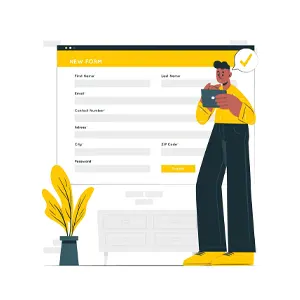Whether you're starting a new job, planning to open a bank account, launching a business, or simply filing your income tax return, one thing you absolutely cannot skip is getting a PAN card. PAN stands for Permanent Account Number, and it is a unique 10-digit alphanumeric number issued by the Income Tax Department of India. This number is used to track your financial transactions, file taxes, and serve as a basic identity proof in many situations.
Applying for a PAN card is mandatory for individuals, companies, firms, trusts, and even minors in some cases. If you don’t have a PAN, you can’t file an income tax return, open a demat account, make high-value financial transactions, or even apply for government schemes. That’s where CallmyCA steps in – we make your PAN application online super simple and quick.
Whether you're applying for a new PAN, correcting details in your existing one, or applying for a reprint due to a lost or damaged card, our CA-backed team handles everything with care and expertise. We help you avoid rejections due to minor form mistakes or document mismatches, which are very common if you try doing it yourself. Plus, you don’t even have to step outside — we’ll get it done right from your mobile or laptop.
We’ve helped thousands of people like you — salaried individuals, freelancers, students, housewives, startups, senior citizens, NRIs, and even NGOs — get their PAN card delivered without confusion or delays. Your application is filed with NSDL or UTIITSL, and we track it until you receive your PAN digitally and by post.









No more queues or confusion – we handle the form filling, document upload, and online submission for you.
Our experts review all details to make sure there are no spelling mistakes or mismatched documents.
We provide PAN services for individuals, businesses, NRIs, minors, trusts, HUFs, and firms
Get your PAN number within 7–10 working days. In some cases, even faster with e-PAN facility.
If your name is wrong, photo unclear, or PAN lost — we help you apply for corrections or a duplicate card
Without PAN, you cannot file your income tax return or receive TDS refunds.
PAN is needed for bank account opening, investments, property registration, and cash deposits above Rs. 50,000.
Your privacy is our priority. All your documents are securely shared and stored.
Got a doubt? Just message us on WhatsApp or call. Our experts are always ready to help you out.
A PAN card is a government-issued ID that is used for all your financial and tax-related work. It is needed for opening a bank account, filing taxes, buying land, getting salary above Rs. 50,000, and even for investments like FD, mutual funds, or stocks.
Any Indian citizen earning money, whether salaried, self-employed, freelancer, or doing business, must have a PAN. Even minors, students, and NRIs can apply. PAN is also needed for companies, trusts, and partnerships.
It usually takes 7–10 working days to receive your physical PAN card at your home. But the e-PAN (soft copy) can be delivered in just 2–3 days on your email.
Don’t worry. We will help you apply for a duplicate PAN card. You will get a new card with the same number, and your e-PAN will also be sent to your email.
For Indian citizens, Aadhaar is mandatory for applying. For NRIs, a passport and foreign address proof are accepted instead.
Yes, with CallmyCA your documents are handled with care and full privacy. We don’t store or share your information without your permission.
e-PAN is a soft copy (PDF format) of your PAN card, sent by email. It is 100% valid for online work, KYC, and verification, just like the physical card.
Yes, we help you apply for a correction. You just need to give a valid document (like Aadhaar) with the correct details. The updated PAN will be sent to you.
Yes. Without a PAN, you cannot file your income tax return. It is also required to get your TDS refund or pay advance tax.
Yes, we help with PAN for firms, companies, LLPs, and HUFs. You just need to send us the registration certificate and identity proof of the business.